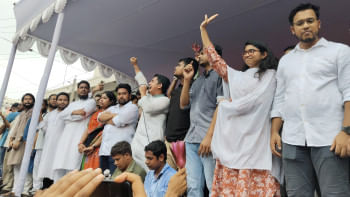Time to use WTO multilateral forum

The US suspended Bangladesh from its Generalised System of Preferences (GSP) scheme on 27 June 2013, following concerns over poor labour conditions particularly after the horrific collapse of Rana Plaza. The US Presidential proclamation confirmed that the suspension has been effectuated because Bangladesh is not taking appropriate measures to afford internationally recognised workers rights in the country to meet the statutory eligibility criteria of labour rights. Later on both the countries entered into bilateral negotiation to reinstate the preferences, where US has conditioned the restoration of GSP on fulfilling the Plan of Actions consisting of 16 requirements. USTR, the US administrative body in its GSP Review of Action Plan (January, 2015) acknowledged the progress in some sectors and also urged for further compliance with worker rights issues.
Bangladesh has been trying to resolve the GSP dispute through negotiations for almost last two years, but which presently seems to be an ineffective means for the country to get the preference back. So it is the high time to challenge the unilateral suspension of GSP program under WTO laws, so far both the countries are WTO members. GSP as a corner stone of Special and Differential (S & D) treatment has become part of WTO laws in 1979 (The Enabling Clause). It has placed the concept of S&D treatment at the heart of the WTO/GATT legal system (Edwinki Kessi, 2007). The Enabling Clause has become part of GATT 1994, on the grounds that it is one of the 'other decisions of the Contracting Parties to GATT 1994' referred to in paragraph 1(b)(iv) of the same 'language of Annex 1A' of GATT 1994. This is subject to another debate whether preferences granted under GSP are voluntary or obligatory (Kele Onyejekwe, 1994).
Even presuming the voluntary nature of GSP simply does not mean that these schemes should not be subject to WTO rules (Lorand Bartels, 2003). Thus any GSP beneficiary member states of WTO can challenge the legality of negative conditionality (suspension or withdrawal of preferences due to a failure to afford internationally recognised workers rights) before the dispute settlement body of WTO (Steve Charnovitz, 2004).
The former US Ambassador Dan W Mozena to Bangladesh said, 'if I were a Bangladeshi I would make powerful arguments before the US Congress to restore GSP and for that you have to have a mechanism to deal with the problem, this is not a rocket science-this is very simple, you have experts and money'. Being failed to restore GSP through bilateral negotiations, cannot Bangladesh take up the issue before dispute settlement body of WTO, if it does it would not be the first country to bring GSP dispute before WTO. One precedent is available that is EC Tariff Preferential Case (2002), from which the country can frame strong arguments in against US GSP suspension.
In December 2002, India challenged the EC special GSP scheme for twelve developing countries excluding India, the appellate body ruled in favour of India stating that the EC regime of special tariff preferences for developing countries was discriminatory and therefore in violation of the 1979 Enabling Clause. It is an established fact that the purpose of GSP is to promote developing countries economy, and anything that are unrelated to that goal that would be inconsistent with Enabling Clause and thereby would amount to be illegal in WTO laws (Jennifer L. Stamberger, 2003).
Bangladesh can choose dispute settlement mechanism set up by WTO to resolve the GSP dispute with US, because in bilateral trade negotiations it finds itself in a highly unequal position, which does not produce a fair outcome. The opportunity to refer the dispute to WTO for settlement where experts and observers from several countries other than the disputants become involved can tilt the balance toward a more level playing field. The country previously experienced two years failed bilateral negotiation efforts to settle an anti dumping dispute with its powerful neighbour India.
Finally as a first LDCs member of WTO, Bangladesh approached WTO to settle the trade dispute and Bangladesh got what the country wanted from the WTO dispute settlement mechanism. Lastly, as a leader of LDCs, Bangladesh should challenge the legality of US suspension of GSP program in WTO forum and there is high probability that it would serve the purpose of the country itself and all developing beneficiary member states as well including LDCs. It is an open appeal to the respective government officials of Bangladesh to take the matter into account and proceed further.
The writer is student of LLM at South Asian University, New Delhi, India.

 For all latest news, follow The Daily Star's Google News channel.
For all latest news, follow The Daily Star's Google News channel. 



Comments